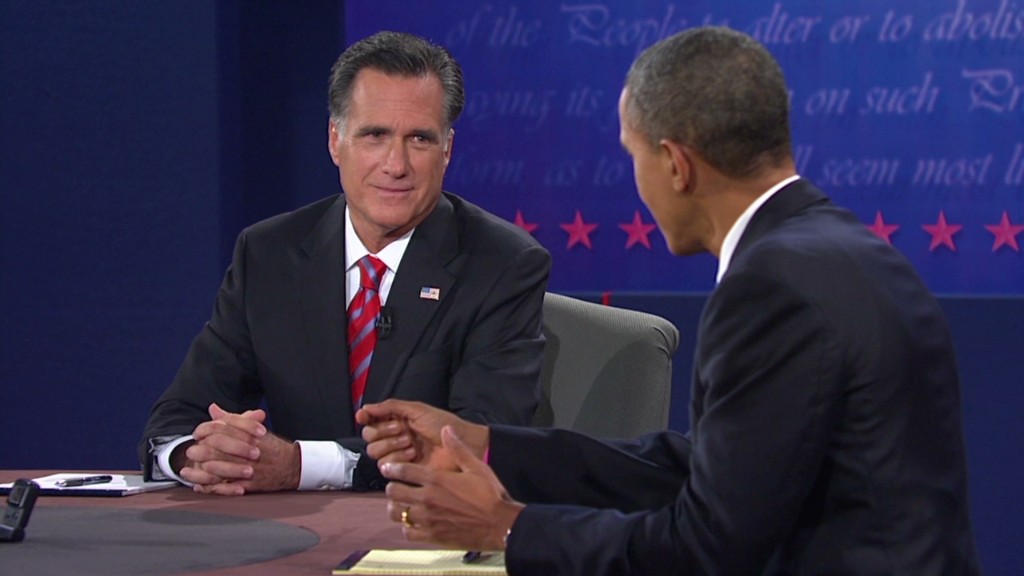
The looming spending cuts at the Pentagon played a starring role in Monday night's foreign policy debate.
Mitt Romney said several times he would "not cut our military budget by $1 trillion."
At issue are changes to defense spending in President Obama's budget, as well as the impending "sequester" that will hit the Pentagon starting on Jan. 2.
For his part, Obama said his budget isn't "reducing our military spending -- it is maintaining it." And, he added, the sequester "will not happen." (Related: Obama vs. Romney on defense spending)
Who's responsible for the defense cuts? Both parties in Congress and Obama approved the sequester.
The cuts are called for under the Budget Control Act. The BCA, which was signed into law in August 2011, was how lawmakers chose to resolve their bitter fight over raising the country's debt ceiling.
The original idea was to pass something so distasteful it would light a fire under lawmakers to finally negotiate a deal to reduce deficits by at least $1.2 trillion over a decade.
But a "super committee" charged with doing so failed. Under the budget law, the next step was the sequester. The cuts would be evenly divided between defense and nondefense spending.
Now, both parties and the Obama administration say the cuts are a terrible idea -- largely because they would be arbitrary and mostly across the board. (Related: Snapshot of economy under Obama)
How deep would the defense cuts be? It depends what you mean by "cuts."
To fiscal experts, a cut means spending that falls below the level authorized by Congress in the prior year -- or even spending that stays at the same level, because it hasn't been adjusted for inflation.
The Budget Control Act actually called for two rounds of changes to defense spending.
The first round, which is already in effect, would not be considered a "cut." The BCA set spending caps, which shaved $487 billion off the Pentagon budget over 10 years. But defense spending would continue to grow at the rate of inflation.
Romney says he would reinstate the $487 billion; Obama incorporated it into his budget proposal.

The second round of changes, the actual sequester, would be a real cut.
Starting in 2013, defense budget authority would be sliced by 9.4%, not including war funding. The cuts to some parts of defense would be higher because Obama has exempted military personnel and veterans' affairs from the sequester.
In dollars, the Congressional Budget Office projects that the Pentagon's base budget will fall to $491 billion in 2013, down from $554 billion in 2012. Thereafter, defense spending will grow with inflation. That would save roughly $500 billion over a decade.
"The Pentagon will still be spending more in 2013 after sequestration than it did in 2006, at the height of the Iraq war," noted Lawrence Korb, who served as assistant defense secretary under President Reagan. (Related: Romney's balanced budget pledge)
Will the cuts hurt defense? Everyone from the top brass at the Pentagon to Republican critics of the Budget Control Act has said the cuts could result in a "hollow force."
The White House budget office has noted, however, that the Defense Department would be able to shift funds to maintain critical military readiness.
Indeed, the operations and maintenance part of the defense budget -- the area that most directly affects military readiness -- is also the most fungible part. Funds can be shifted to what is deemed most important.
"This is a management issue, not a readiness issue," said Gordon Adams, who was the senior White House budget official for national security under President Clinton.
Adams said the cuts likely would be felt most heavily by general service personnel at the Pentagon through attrition and furloughs and by service contractors (those who provide everything from mess hall services to security guards).
None of that means, however, that the cuts are advisable. After all, they only exist because Congress failed to reduce deficits in a smarter way.
Why can't Congress just cancel the cuts? Easier said than done. Lawmakers need to negotiate a deal to avoid the defense cuts and the rest of the fiscal cliff -- $7 trillion in tax increases and spending cuts that start taking effect next year.
But both parties are still publicly holding the line on their demands. The Republicans want to cancel the defense cuts and head off tax increases. The Democrats want to increase taxes on the rich before they agree to replace the sequester with more gradual and less arbitrary cuts.
Just last week, the White House was signaling again that the president would not sign legislation that cancels the cuts but extends the Bush-era tax cuts for high-income taxpayers.


